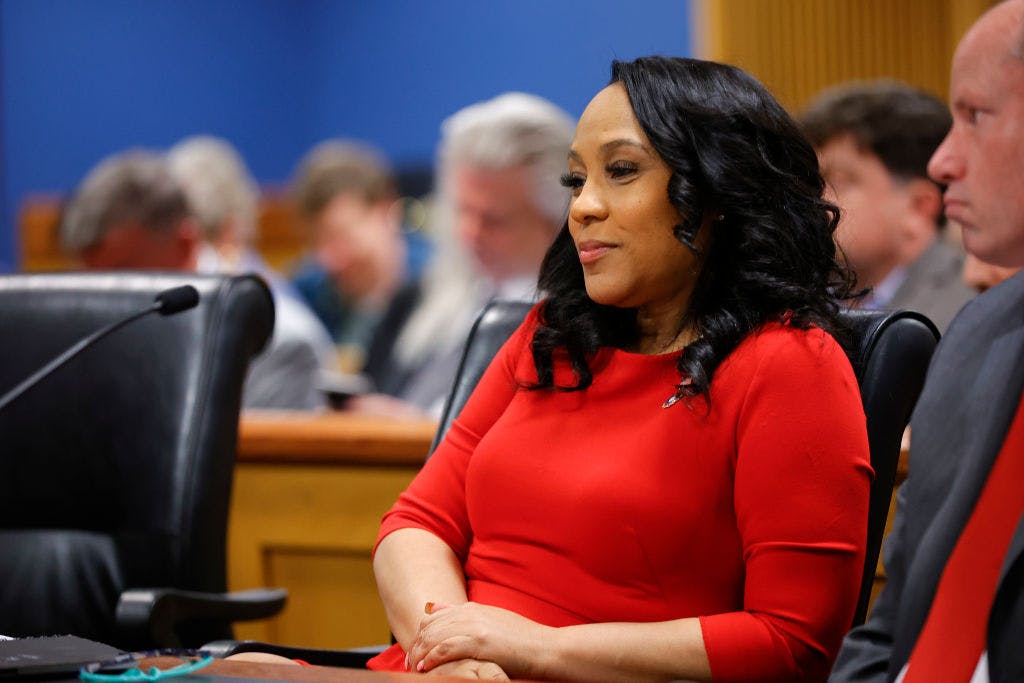‘Suspicious’ Judge Scolds Fani Willis for Hiding Correspondence With Jack Smith Over Trump Prosecution
A state court judge finds her obfuscations ‘suspicious’ and demands to review the documents himself.

A dressing down in court for the district attorney of Georgia’s Fulton County, Fani Willis, brings her one step closer to yielding up her correspondence with two of President Trump’s primary foes — Special Counsel Jack Smith and the House January 6 committee.
Judge Robert McBurney told the district attorney on Friday, “It’s kind of suspicious that you have no documents” with respect to records between the Peach State prosecutor and Mr. Smith and the legislative body. It is the latest setback for Ms. Willis, who has been disqualified from her case against Mr. Trump for her secret romance with her special prosecutor, Nathan Wade.
Judge McBurney in a hearing told the lawyer representing the district attorney’s office, “First, you claim there are no documents because you didn’t search. Then, after searching, you still find no documents. Now, everything except what was given to the DA’s office is somehow exempt.” Ms. Willis had previously asserted that she possessed no “responsive” documents. That was untrue.
The judge has now ordered Ms. Willis to turn over to him a tranche of documents relating to those correspondences. The case was launched last year by a conservative legal organization, Judicial Watch, which pointed to Georgia’s open records law in order to gain access to the documents. Ms. Willis’s office has repeatedly violated its disclosure obligations to such an extent that Judge McBurney now orders her to pay $21,578 in attorneys’ fees.
Ms. Willis for months averred in court that her office possesses any documents that were responsive to Judicial Watch’s request. Now, she argues that such records exist, but that “they are exempt pursuant” to various species of privilege. Judicial Watch contends that Ms. Willis’s responses have been so dilatory — she has been found to be in “default” — as to justify the appointment of an independent monitor, or special master.
Judicial Watch explains in a statement: “Fani Willis was caught red-handed hiding records. … We’re asking the court to appoint a special master because Willis simply can’t be trusted to come clean.” On Friday, though, Judge McBurney reckoned that he “can appoint a special master” but that he is not yet ready to do so. First, he is going to review the documents himself.
Judge McBurney disclosed that his decision about whether to bring on external help will depend on the quantity of records in Ms. Willis’s possession. “If it’s 55 pages, we don’t need a special master, I can do that,” the judge reasoned. “If it’s 5,550 pages, I’m not looking at 5,500 pages. Well, I will, but I’ll get that done over the next four years. And that’s not helpful to anyone.”
Ms. Willis has argued that “the appointment of a Special Master in an open records case is not provided for by statute, unprecedented under the law, and overly intrusive.” Georgia law allows for the appointment of special masters “to provide guidance, advice, and information to the court on complex or specialized subjects” and to “monitor implementation of and compliance.”
The district attorney, who celebrated her re-election last month at a gala she threw for herself with the theme of “For the Love of Justice,” was last week castigated by another judge, Shukura Ingram, for proffering “absurd” arguments for why a subpoena issued to her from the Georgia senate ought to be quashed. Judge Ingram determined that Ms. Willis’s position “could and would result in lost evidence, fading memories, and general inefficiency.”
All of this comes as Ms. Willis is making her last stand to avoid permanent disqualification from the sprawling racketeering case against Mr. Trump and 18 others. She once vowed that “there are efforts to slow down this train, but the train is coming,” with respect to convicting the 47th president, but now her last stop is the Georgia supreme court.
The Georgia court of appeals in December ruled that Ms. Willis’s entanglement with Mr. Wade was “the rare case in which disqualification is mandated and no other remedy will suffice to restore public confidence in the integrity of these proceedings.” If the Georgia supreme court declines to take up Ms. Willis’s petition for review, that ruling stands, and another prosecutor will have to be found to press forward with the case — or drop it.

